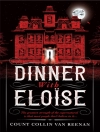‘Drácula’, la obra maestra de Bram Stoker publicada en 1897, es un hito en la literatura de terror gótica. A través de una compleja narrativa epistolar, que incluye cartas, diarios y recortes de prensa, Stoker presenta la historia del conde Drácula y su búsqueda por expandir su dominio a Londres. El estilo literario es meticuloso y evocador, creando una atmósfera de tensión y horror que refleja las inquietudes victorianas sobre la sexualidad, la identidad y el otro. En un contexto literario marcado por el auge del romanticismo y la exploración de lo sobrenatural, Stoker logra entrelazar mitología y psicología, ofreciendo una profunda exploración de la naturaleza humana y el miedo ante lo desconocido. Bram Stoker, un escritor irlandés cuyas experiencias laborales en el teatro y su amistad con personalidades literarias influyeron en su carrera, dedicó años de investigación a la creación de ‘Drácula’. A través de su conocimiento de las leyendas sobre vampiros y su fascinación por la ciencia de su época, Stoker construye con astucia un personaje icónico que ha dejado una huella indeleble en la cultura popular. Su conexión con las temáticas de la lucha entre la luz y la oscuridad revela una inquietud por los cambios sociales de su tiempo. ‘Drácula’ es una lectura imprescindible para aquellos interesados en el terror psicológico y la exploración de los miedos profundos de la sociedad. Su complejidad narrativa y rica simbología le confieren un valor literario que trasciende su época, y su influencia perdura en la literatura y el cine contemporáneos. Recomiendo fervientemente este clásico a todo lector que desee adentrarse en las profundidades del horror y la fascinación por lo sobrenatural.
Bram Stoker
Drácula [EPUB ebook]
La oscura y apasionante saga del Conde que desafía la vida y la muerte en la Inglaterra victoriana
Drácula [EPUB ebook]
La oscura y apasionante saga del Conde que desafía la vida y la muerte en la Inglaterra victoriana
Mua cuốn sách điện tử này và nhận thêm 1 cuốn MIỄN PHÍ!
Ngôn ngữ tiếng Tây Ban Nha ● định dạng EPUB ● Trang 336 ● ISBN 8596547686743 ● Kích thước tập tin 0.9 MB ● Nhà xuất bản Good Press ● Thành phố Prague ● Quốc gia CZ ● Được phát hành 2023 ● Có thể tải xuống 24 tháng ● Tiền tệ EUR ● TÔI 9256477 ● Sao chép bảo vệ DRM xã hội












